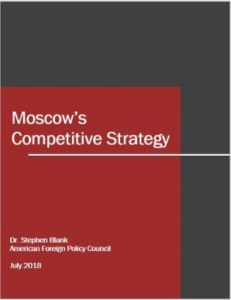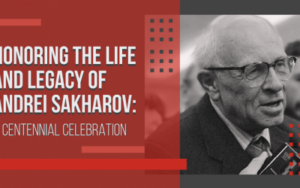 Despite the Kremlin’s international assertiveness, Russia’s principal strategic challenges are domestic, according to a prominent analyst.
Despite the Kremlin’s international assertiveness, Russia’s principal strategic challenges are domestic, according to a prominent analyst.
In the political realm, the looming hurdle will be managing the transition to a new regime that follows the current leader, Vladimir Putin, while avoiding the Scylla of instability and the Charybdis of deepening stagnation, Carnegie Moscow Center’s Dmitri Trenin writes for the Economist. In the realm of economics, unchaining the country’s potential—held back by monopolies and corruption from unaccountable, self-serving elites—is critical.
Russians were not impressed with what 30 years of democracy had delivered, and wouldn’t mind giving a different model a try, claims journalist Andrei Zolotov.
“The idea is very attractive to some because of the pervasive perception that ‘democracy doesn’t work anyway’,” he tells the Times, noting that the transition from communism to capitalism during the 1990s remains a source of national trauma, and that Russia after two decades of Mr. Putin’s rule is hardly democratic.

Levada
During Putin’s 21-year rule, Russian authorities have encouraged the nation to develop a highly selective memory of the Soviet era – the repressions and the Gulag are not even a compulsory part of school history teaching, The independent Levada Centre found in a 2019 poll that 70 per cent of Russians thought Stalin played a positive role, and 48 per cent back the idea of erecting a statue to Stalin, compared to 25 per cent in 2010, the Irish Times reports.
“What happened here in the 20th century – 20 million people put through the Gulag system, two million died there, six million deported – is biblical in scale, planetary, and we must try to comprehend this,” says Roman Romanov, director of the Gulag History Museum in Moscow.
Some researchers complain of legal threats and intimidation, the Irish Times adds, citing the case of Denis Karagodin, who is being sued by the son of a former NKVD employee for defamation and the particularly notorious case of Gulag historian Yuri Dmitriev, who found a mass grave in north-western Russia, after which the authorities fabricated a child sex abuse charge against him, and he is now serving 13 years in jail.
 “You can draw a line from Andrei Sakharov’s time as a political prisoner, from his struggle to ensure that Russia faces up to its past and the importance of documentation and truth to prevent new atrocities, straight up to Yuri Dmitriev’s struggle in modern-day Russia,” according to the Norwegian Helsinki Committee.
“You can draw a line from Andrei Sakharov’s time as a political prisoner, from his struggle to ensure that Russia faces up to its past and the importance of documentation and truth to prevent new atrocities, straight up to Yuri Dmitriev’s struggle in modern-day Russia,” according to the Norwegian Helsinki Committee.
Three factors will determine the opposition’s prospects in future elections, and perhaps the country’s political future itself, according to analyst Alexander Zamyatin:
- the now scandalous electronic voting system used in Moscow;
- the Smart Voting tactical voting scheme designed to support single opposition candidates against United Russia candidates;
- and the stance of Russia’s Communist Party.
The Kremlin had ensured that “nothing could go wrong” with last week’s parliamentary elections, said Deutsche Welle’s Christian F. Trippe, confirming that Putin’s Russia is a “managed democracy.” The opposition was effectively managed, Konstantin Eggert told Echo of Moscow.
Ten years ago, Russian society was lively and pluralistic, said Frank Nienhuysen in Süddeutsche Zeitung (Munich). Today “apathy and powerlessness” rule. “Hardly anyone in Russia is still making a fuss about the fact that the election was obviously rigged in so many ways.”
Yet United Russia won less than a third of the vote and not the nearly half reported, Paul Goble’s Window on Eurasia observes. Stanford University’s Michael McFaul, a former U.S. ambassador to Moscow, was also unimpressed with United Russia’s performance.
Imagine if Biden & Democratic Party controlled Fox, NBC, ABC, CBS, MSNBC, CNN, all governors, nearly all members of Congress, had unlimited resources, didn’t allow most popular GOP leaders to participate (arrested most popular), & STILL won only half the votes. Victory? Really?
— Michael McFaul (@McFaul) September 20, 2021
For decades, the United States has seen the South Caucasus as a strategically important region and has heavily invested in development, security, and democracy assistance, FPRI adds. On October 2, Georgia will hold its municipal elections. The election will take place against the backdrop of months-long parliamentary standoffs and political crises, the still-raging COVID-19 pandemic, Tbilisi’s continued fall from grace with its Western partners, and deep societal divides fueled by Russian disinformation and propaganda. What will the outcome of the election tell us about the future of Georgia’s struggling democracy?
 The Future of US Strategic Interests in the South Caucasus: Challenges and Opportunities for the Biden Administration. October 05, 2021 | 10:00 am to 12:00 pm.
The Future of US Strategic Interests in the South Caucasus: Challenges and Opportunities for the Biden Administration. October 05, 2021 | 10:00 am to 12:00 pm.
Speakers:
- Nino Evgenidze, Executive Director at the Economic Policy Research Center (EPRC); co-founder of the Tbilisi International conference with the McCain Institute and Stanford University’s Center for Democracy, Development, and Rule of Law, and co-founder of the Fukuyama Democracy Frontline Center.
- Eka Gigauri, Executive Director at Transparency International Georgia.
- Batu Kutelia, Vice President of the Atlantic Council of Georgia and a Next Generation Leader Fellow at the McCain Institute for International Leadership.
- David J. Kramer, Senior Fellow in the Vaclav Havel Program for Human Rights & Diplomacy at Florida International University.
- Miro Popkhadze, a Fellow in the Eurasia Program at the Foreign Policy Research Institute.
- Vasil Sikharulidze, Chairman of the Atlantic Council of Georgia as well as a lecturer at Georgian Institute of Public Affairs and Ilia University, Tbilisi.
- Maia Otarashvili, a Research Fellow and Deputy Director of the FPRI Eurasia Program.







